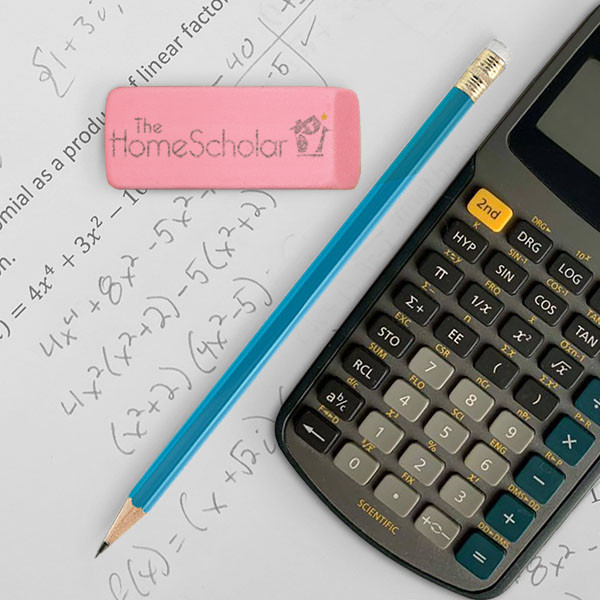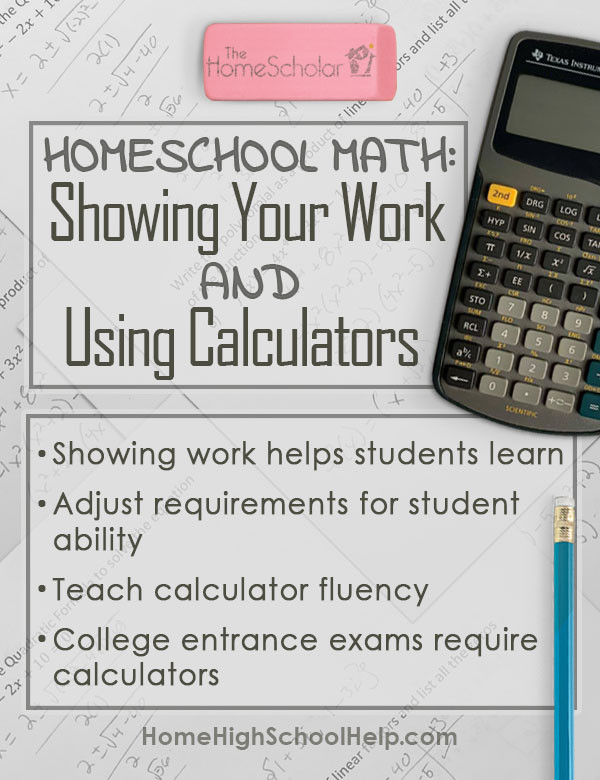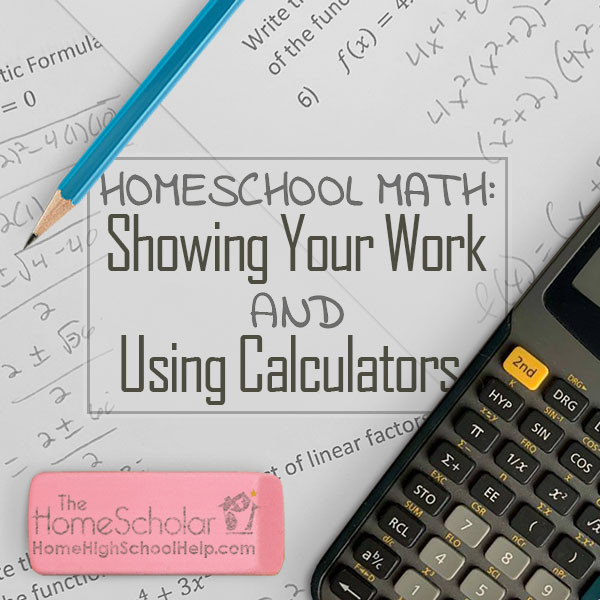Homeschool Math - Showing Your Work and Using Calculators
What are you fussing about today? I remember having conflict specifically about "showing your work" in homeschool math. Exactly how do you know when it is important? And when is it not important at all?
Showing Your Work in Homeschool Math
Conflict about "showing your work" in homeschool math is never fun! I hated fighting with my kids about showing their work. Some will say "always show your work" and others will say "why show your work, anyway?" I think we should take a step back and think about it from a different perspective. Your job is not to make her show her work or not. Your job is to make sure she LEARNS, right? Some children will learn best by showing all their work, and others find the work too repetitive or boring, so giving an oral answer makes sense (like we did for elementary level math.) So maybe our best strategy is to make her show as many answers as she needs to in order to learn.
That's all very well and good, but here is what you might do in concrete terms. If she shows all of her work and gets a 90% or above on her homework, then she is learning her math and has learned how to show her work. Perhaps for the rest of the week she can show her work on just two or three problems. The other problems she can simply write the answer without the solution. If she scores less than 90% on that homework, then the following day she has to show all her work again. That will give her an incentive to get the answers correct. It will help her learn to show her work, but also show her that the learning is more important.
When my child's answer didn't match the answer in the answer key, I made my student contact the company and get the explanation (most of the time, anyway.) I was so busy with everything else, I just didn't have time, so I told my kids it was going to be marked as wrong unless they called the textbook company and got their approval that the answer key was wrong. The only exception was when they talked my husband into helping them.
If the student's answer is right and no cheating occurred, but your child found a different path to get the answer, that's fine. It's important to know there are options to getting the answer. I would only be concerned when the answer is wrong.
Using Calculators in Homeschool Math
Calculators will only be allowed in certain math sections of the SAT® and ACT®. Students must be able to quickly calculate using mental math. At the same time, they must understand math in the real world, using calculators to quickly solve problems correctly.
Becoming comfortable with a scientific or graphing calculator takes time and requires regular practice, which is why it's important to incorporate calculator use into everyday math practice. When students take the SAT®, ACT®, or AP® tests, they will not be allowed to use their cell phone for calculations. They must have an appropriate calculator they are familiar with and comfortable using. This is an important skill that will serve students well in classrooms as well as exams (and life in general), so be sure to practice regularly!
Judgement-Free Homeschool Math Tips
This is totally a homeschool math no judgment zone! Let's talk about it without making you cry. Here are some helpful homeschool math tips:
- Our goal is to get through one math level per year. There is no specific level you need to have in order to graduate.
- Don't let math be the determining factor on whether your child graduates or not. While calculus may not be important for vet school, math is important in general for scholarships of any kind. A science-minded child may do better with Saxon math, even if mom or dad thinks it's crazy to choose such a scary-looking curriculum.
- You can speed up math when your child knows some concepts and not others. That might happen with a gifted child learning math naturally when you aren't looking. It might happen after you have switched math curriculum, perhaps more than once, when you're trying to find a good math fit.
- You can be more consistent with math when you use a video tutorial that coordinates with math lessons. This is especially helpful if you are a little unsure about math, or can't convey a generally positive attitude while teaching math.
Need more ideas? Read this short Coffee Break Book: High School Math the Easy Way: Simple Strategies for Homeschool Parents in Over Their Heads. In this book, you will learn how to teach homeschool high school math with the correct sequence, curriculum, attitude, and speed. You will discover curriculum options, learn how to keep great math records, and get beyond mere good intentions to actually get the job done in your homeschool. There's even a special section on how to teach any particularly nerdy kids that might be living under your roof.
Here's a video book review for you:
The key is, don't stress about math! There are plenty of resources and varieties of curriculum to fit your needs.
When you subscribe to the blog, we will send you an e-mail when there are new updates on the site so you wouldn't miss them.

 Login
Login










.jpg)

Comments